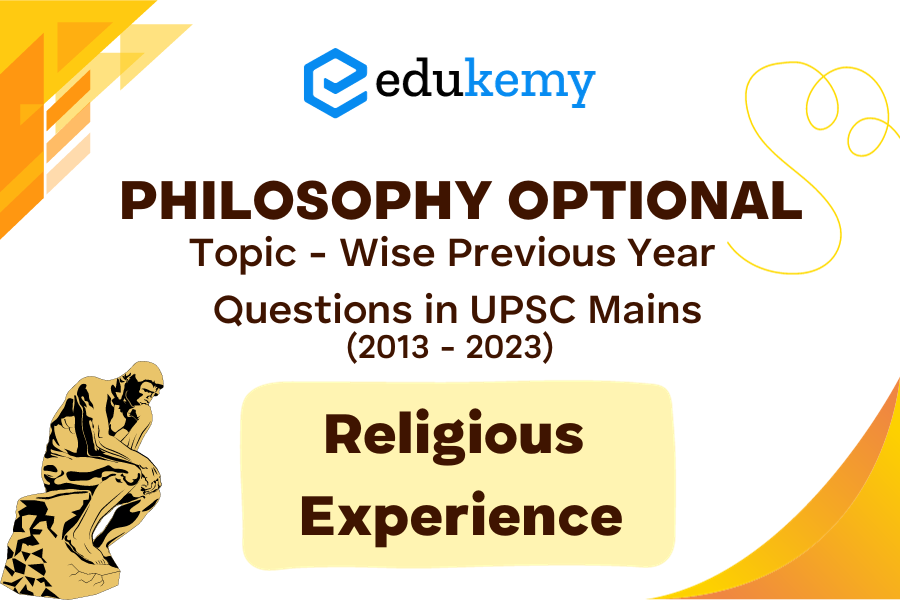
If you’re an aspirant gearing up for the prestigious UPSC Mains examination, and philosophy is your optional subject of choice, then you’re about to delve into the profound world of philosophical thought. Within the vast and diverse realm of philosophy, one of the intriguing areas of study is “Religious Experience.” This blog is dedicated to helping you navigate the intricate landscape of this optional topic by focusing on the wise selection of previous year questions from 2013 to 2023. By dissecting these questions and exploring the various dimensions they touch upon, we aim to provide you with invaluable insights into how to approach this subject and prepare effectively for the UPSC Mains.
The topic of “Religious Experience” is a fascinating journey into the human psyche, beliefs, and spirituality. Through this series of previous year questions, we’ll embark on a comprehensive exploration of the philosophies, theories, and perspectives that have shaped the discourse on religious experiences. As you read through the upcoming blog posts, you’ll gain a deeper understanding of the key concepts, prominent philosophers, and the evolving debates in this area. Whether you’re a seasoned philosopher or a newcomer to this subject, our aim is to equip you with the knowledge and skills necessary to tackle this topic with confidence and excel in your UPSC Mains examination. So, let’s embark on this intellectual adventure and unlock the mysteries of “Religious Experience” through the lens of UPSC’s previous year questions.
Contents
Religious Experience Philosophy – Previous Year Questions (UPSC CSE Mains History Optional)
1. In order to make expressions of religious experiences communicable, what kind of language needs to be considered andused ? Explain. (2017/15)
2. Explain the nature of mysticism Hinduism and Islam.(2015/15)
3. Discuss the conflicting nature of religious experience with special reference to Buddhism and Jainism. (2014/15)
4. What is the nature of mystical experience? (2013/15)
5. Is mystical experience open to different interpretations? (2013/15)
6. Can mystical experience be regarded as valid source of knowledge ?(2013/20)
7. What is the object of religious experience ? Is it empirical or trans-empirical ? Explain in detail . (2012/30)
8. If religious experience is unique, what makes it an experience? How is this experience logically different from the experience of loneliness, happiness, etc.? 10/20
9. Explain the nature of religious experience. Can this experience be validated? 09/201
10. The difference between numinous and mystical experience. Critical notes. 07/20.
11. “Mysticism is the power of spiritual access to domains ofknowledge closed off to ordinary thought.” Critical notes. 05/20
FAQs
Q: Why is it often said that “Religious experience cannot be explained by reason?”
A: A religious experience is deeply personal and often transcends the bounds of logic and rationality. It is believed to be a direct encounter with the divine or the sacred, making it difficult to fit within the confines of reason and explanation. Instead, religious experiences are often described as subjective and deeply emotional encounters with the divine.
Q: What are the four main types of religious experiences?
A: The four primary types of religious experiences include mystical experiences, conversion experiences, revelatory experiences, and nature experiences. These encounters can vary greatly from person to person and may involve a profound sense of oneness with the divine, a transformative change in one’s beliefs, direct communication from a deity, or a spiritual connection with nature.
Q: How has religion expanded and evolved over time?
A: Religion has expanded and evolved throughout history in response to changing social, cultural, and philosophical contexts. As societies and civilizations have developed, religious traditions have adapted, merged, or given rise to new belief systems. This expansion has led to the diverse range of religions and spiritual practices that exist today.
Q: What is the definition of a religious experience?
A: A religious experience is a profoundly personal encounter with the divine, sacred, or transcendent. It typically involves a deep sense of spirituality, often marked by intense emotions, feelings of connection with the divine, and a sense of meaning and purpose. These experiences can manifest in various forms, such as visions, dreams, meditation, prayer, or encounters with religious texts and rituals. They are subjective and can vary widely among individuals.
In case you still have your doubts, contact us on 9811333901.
For UPSC Prelims Resources, Click here
For Daily Updates and Study Material:
Join our Telegram Channel – Edukemy for IAS
- 1. Learn through Videos – here
- 2. Be Exam Ready by Practicing Daily MCQs – here
- 3. Daily Newsletter – Get all your Current Affairs Covered – here
- 4. Mains Answer Writing Practice – here

